|
Continuing Privatization of BC Hydro
Oppose Liberal Government's Wrecking of
BC Hydro
|
All Out for May Day 2013
International Day
of Working Class
Unity and Struggle!
CALENDAR OF EVENTS
|
|
Continuing
Privatization of BC
Hydro
• Oppose Liberal Government's Wrecking of BC
Hydro - Charles Boylan
• The Run of River Scams
April 28 National Day
of Mourning
• Greater Vancouver Ceremony at Steveston
• Vancouver District School Board Recognizes
Day of Mourning
• Events and Memorials on Vancouver Island
Whose Resources? Our
Resources!
• NDP Leader Speaks Out Against Kinder Morgan
Pipeline Expansion to Vancouver Harbour
• Who Decides? The Need for Public Control of
Natural Resources
May Day 2013
• All
Out for International Day of Working Class Unity and Struggle
Continuing Privatization of BC Hydro
Oppose Liberal Government's Wrecking of BC Hydro
- Charles Boylan -
The Liberal government's 2007 "Energy Plan: A Vision
for Clean
Energy Leadership" was a continuation of its 2002 "Energy Plan" to pay
the rich
on the backs of BC home and small business electricity users. The major
features of the Liberal government's 2007 plan were as follows:
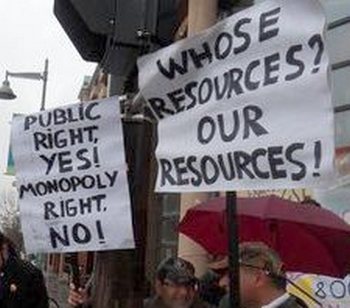 - BC Hydro to acquire
private power to meet arbitrary
energy
self-sufficiency targets by 2016 based on lowest rainfall years with
huge costs assumed by
BC Hydro; - BC Hydro to acquire
private power to meet arbitrary
energy
self-sufficiency targets by 2016 based on lowest rainfall years with
huge costs assumed by
BC Hydro;
- BC Hydro to acquire an additional 3,000 GWH of
"insurance power" by
2026;
- Promotion of small power projects (up to 10 megawatts)
by a Standing
Offer Program at a set purchase price;
- BC Transmission Corporation directed to build
transmission lines to
service additional power from the private sector;
- Zero greenhouse emissions from coal fired electricity generation;
- Zero greenhouse emissions from existing thermal generation plants by
2016;
- Discontinue using Burrard Thermal for energy planning by 2014;
- Find 50 per cent of BC Hydro's new energy needs through conservation
by 2020;
- Extend Heritage Contract in perpetuity;
- Begin consultations on Site C.[1]
The government plan was to step up the enforced
purchasing by BC
Hydro of private power at over-priced rates. Manipulation of public
opinion was
carried out through TV advertising suggesting BC needed to become
"self-sufficient" in electricity, which could only be accomplished
through private power
production. A false image was presented that BC was dependent on
imported power, when in fact BC Hydro had been making effective use of
purchasing
power from Alberta, which is one hour ahead of BC, and selling power to
the U.S.
A rational pan-Canadian electrical system that makes
sense and
guarantees Canadian sovereignty would be to build a public east-west
power grid so that
peak power can shift along the four-and-a-half time zones from east to
west, and secondarily, by entering into a mutually beneficial power
exchange
arrangement with various U.S. states close to the border.
In opposition to a rational public plan, the Liberal
government
politicized the private interests of certain investors by guaranteeing
a market for their
private power production at absurdly high prices. The government forced
BC Hydro to enter into long-term purchasing contracts with private
power producers
to meet a fabricated self-sufficiency target and even provide a
surplus. To exacerbate matters, the targeted self-sufficiency was set
at the lowest rainfall levels
and the Burrard gas thermo-generating plant in Port Moody near
Vancouver was taken out of production.
 In an example of
pay-the-rich neo-liberal politics, an
exaggerated
demand for private power was imposed on BC Hydro by executive dictate
from the
Premier's Office. Neo-liberal "smaller government" does not mean an
elimination of executive rule, which politicizes privileged private
interests; it means
depoliticizing the public interest through elimination of social
programs, public services and enterprises required by the people and
society. It means a refusal
to meet government's social responsibilities. In an example of
pay-the-rich neo-liberal politics, an
exaggerated
demand for private power was imposed on BC Hydro by executive dictate
from the
Premier's Office. Neo-liberal "smaller government" does not mean an
elimination of executive rule, which politicizes privileged private
interests; it means
depoliticizing the public interest through elimination of social
programs, public services and enterprises required by the people and
society. It means a refusal
to meet government's social responsibilities.
"Big government," executive rule and private interests
dominate when
it comes to siphoning wealth from the public to hand it over to the
monopolies
like General Electric, Rio Tinto Alcan and Teck-Cominco, three of the
largest private producers of electricity from whom BC Hydro has been
forced to
purchase over-priced electricity.
Another factor used to manipulate the artificially high
quantity of
electricity BC Hydro had to purchase was to discount the important
downstream benefits
accrued from the Columbia River dams located in BC. Some 4,300 GWH are
an entitlement from agreements with U.S. power producers for the water
storage
dams built during the 1960s. That block of power was deliberately not
included in BC's reserves, which gave the Liberal government an
opportunity to force
BC Hydro to over-supply itself with private, over-priced electricity,
which guarantees private gain for the monopolies at the expense of
ordinary
ratepayers.
An illusion was created that those high-priced long-term
private
power contracts would not be a burden because the higher prices were
factored in year
by year. The expensive private power has been mixed in with the
low-priced public power but as the high prices begin to dominate, as
they
are now, British
Columbians are experiencing a pricing shock for their power. To
mitigate this public shock and discredit any opposition, the Liberal
government has handed
over millions of dollars in public funds to TV monopolies and other
mass media to disinform the people and stop public opinion from forming
that would
demand a pro-social direction for the economy and specifically on the
issue of electricity production.
The Liberal government from its own record during its
over one decade in power does not deserve a single vote on May 14.
Note
1. Material on Liberal
government's Energy Plan
based on John
Calvert's power-point lecture presented February 28, 2012 to the Simon
Fraser
University Dean of Environmental Studies Lecture Series. Video of his
lecture available here.
Calvert is also the author of Liquid Gold.

The Run of River Scams
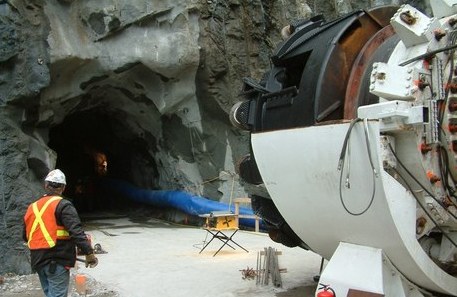
Construction of
Ashlu River run of river IPP project. It is owned by Innergex Renewable
Energy and is expected
to produce 265,000 mWh annually. The power is sold to BC Hydro on a
long-term contract at exorbitant rates.
|
The run of river private power projects are a major
aspect of an elaborate scam drafted by the financial oligarchy to
plunder BC Hydro and the energy resources of the province. The Liberal
government has allowed "Independent Power Producers" to seize hundreds
of rivers for their personal gain. Those rivers can produce power only
during the spring run-off. Their small hydro projects, which cost BC
Hydro a lot of money to connect to the power transmission grid, produce
electricity at precisely the same time a surplus of power is generated
by the Peace and Columbia River dams, when their reservoirs
are also overflowing during the spring runoff.
The run of river projects do not have storage dams. This is supposed to
make them "clean energy," even though in practice evidence has shown
that they regularly run streams dry and destroy fish stocks. When
energy is required during low water months, many of these private
projects do not produce power to provide BC Hydro.

Click image
to enlarge.
|
Another aspect of this pay-the-rich scam of the
Liberal government is
that the long range contracts signed in this period, from 20 to 60
years in duration, dictate the price BC Hydro must pay, which averages
out to about $100 a kWh. Yet the average export price for the same
power, if BC Hydro sells it to the U.S. has been $25-$30 a kWh!
For good measure, the private power sale contracts contain a clause to
guarantee that BC Hydro must pay the private sellers a "cost of living
adjustment" (COLA) over the years. Compare this with the attacks on
retired workers who have had their pension COLA clauses arbitrarily
reduced or eliminated. At this moment, Canadian steelworkers at a U.S.
Steel-controlled mill in Nanticoke, Ontario are locked out, as the
boorish "ugly American" owners have returned with vengeance demanding
anti-worker concessions, including an attack on the workers' wage COLA.
Yet General Electric, Rio Tinto Alcan and Teck-Cominco among others
have a COLA clause to ensure their gouging of BC ratepayers and the
public treasury keeps up with inflation!
The people of BC need to respond to this robbery and destruction of BC
Hydro with one voice: Stop Paying the Rich! Defeat the Clark
neo-liberal regime on May 14!

April 28 National Day of Mourning
Greater Vancouver Ceremony at Steveston
 Irene Lanzinger,
Secretary-Treasurer, BC Federation of Labour, addresses Greater
Vancouver Day of Mourning Ceremony.
Irene Lanzinger,
Secretary-Treasurer, BC Federation of Labour, addresses Greater
Vancouver Day of Mourning Ceremony.
The National Day of Mourning in Greater Vancouver was
held at Garry
Point Park in Steveston at the monument honouring the fishers who have
perished
at sea on the West Coast over the past century. Held right next to the
swirling muddy brown Fraser River in the
midst of a fast outgoing tide, in the wind, under broken clouds, with
patches of blue
sky and intermittent sunshine, the setting enhanced the sombre mood of
the gathering. The Fireman's Band led
a solemn procession to the podium. Vancouver and District Labour
Council
President Joey Hartman opened the ceremony abd emphasized that "all
workers have a right to
work in a safe workplace." The participants then
stood for two minutes of silence to honour the dead.
About 150 workers and families gathered to commemorate
the 181
workers in BC who died in 2012 including four young workers killed on
the
job. Over 100 died of work-related illnesses. Ed Salinger, President of
the
BC Professional Firefighters Association, spoke about the 10 recognized
cancers that are killing
firefighters because of toxic chemicals associated with
contemporary blazes.
Malcolm Brody, Mayor of Richmond, emphasized the past
economic
importance of the BC wild fishery marked by the tragic reality of
hundreds of fishers
who have drowned throughout the century in the turbulent waters and
weather of the West Coast.
Irvin Figg, representing the United Fishermen and Allied
Workers'
Union linked the tragic deaths of BC fishers with the West,
Texas explosion
of a fertilizer plant killing many workers and residents as well as the
criminal massacre of Bangladeshi garment workers a week previously. He
said in BC
the fishery and forestry industries rival one another each year for the
greatest number of workers killed on the job, adding that even with the
greatly diminished
size of the fishery,
some 13 fishers die each year in BC.
Irene Lanzinger, Secretary-Treasurer, BC Federation of
Labour, spoke
about the high number of work-related deaths in BC. She emphasized the
need
to increase pressure on governments to enforce both criminal
prosecutions for
those violating various regulations and the laws meant to guarantee
workers'
safety.
Marcel Marsolais, President of theNew Westminster Labour
Council, said
safety at work is both an individual and collective right. He spoke
about ongoing
cases of mesothelioma, a lung cancer caused by asbestos. He recalled
how "Grant's Law," that calls for two workers to be on shift in
all-night gas stations and
other such
places, was abrogated by Christy Clark to appease the "business
community." The law was named after a youth working alone in a gas
station who was killed
trying to prevent the theft of a small amount of gasoline. Marsolais
also
noted how big business gave former Liberal Finance
Minister Kevin Falcon the "golden
scissors" award for "cutting red tape" and making industries
"self-regulating" in the name of "small government," i.e., politicizing
private interests while over-riding the public interest.
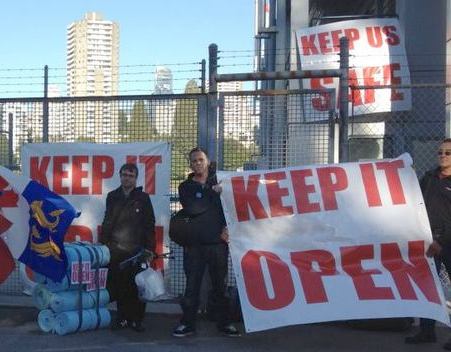 Bob Jackson, BC Regional
Executive Vice-President of the Public
Service Alliance of Canada, spoke about a meat inspector in
Saskatchewan
who died of cancer from working in asbestos insulated buildings. He
also talked about the bitter fight to keep open the Kitsilano Coast
Guard Station in
Vancouver which was closed by the Harper government in the name of
austerity. Jackson said too many lives have been lost on the BC coast
from inadequate
Canadian coast guard services. Bob Jackson, BC Regional
Executive Vice-President of the Public
Service Alliance of Canada, spoke about a meat inspector in
Saskatchewan
who died of cancer from working in asbestos insulated buildings. He
also talked about the bitter fight to keep open the Kitsilano Coast
Guard Station in
Vancouver which was closed by the Harper government in the name of
austerity. Jackson said too many lives have been lost on the BC coast
from inadequate
Canadian coast guard services.
Concluding the event, Joey Hartman called on everyone to
take a rose and place it on the fishers' memorial to honour all the
workers'
killed at their
workplace or from workplace contracted diseases. In the course of the
event, workers and trade union officials expressed thanks on receiving
the special issue of TML
on Day of Mourning and made generous contributions for its
production.
Missing however, were representatives of the younger
generation of
workers, a large portion of whom are non-union, working on dangerous
constructions
sites, in warehouses, and driving trucks on treacherous highways
throughout the province. They, like the four young workers killed on
the job in BC in 2012,
face the dangers posed by reckless and socially irresponsible employers
served by equally socially irresponsible governments.

Vancouver District School Board Recognizes
Day of Mourning
The following notice was sent by email to all schools in
Vancouver,
BC by Steve Cardwell, EdD (Doctor of Education), Superintendent,
Vancouver
School District.
***
Re: Day of Mourning -- April 28, 2013
I am writing to you to acknowledge that Sunday, April
28th is the
National Day of Mourning. This date commemorates workers who have been
killed,
injured or suffered illness due to workplace related hazards and
incidents. The numbers are staggering. In 2011, 919 workplace deaths
were recorded in
Canada -- a decrease from 1,014 in the previous year. This represents
more than 2.6 deaths every single day. In the nineteen year period from
1993 to 2011,
17,062 people lost their lives due to work-related causes (an
average
of 898 deaths per year).
Workers' Memorial Day was started by the Canadian Union
of Public
Employees in 1984, and the Canadian Labour Congress officially declared
it an
annual day of remembrance in 1985 on April 28. The date 28 April was
picked because on that day in 1914, the Workers Compensation Act
received its
third reading. In December 1990, this day became a national observance
with the passing of the Workers'
Mourning Day Act, so that on April 28,
1991,
it was officially the National Day of Mourning. In 2001 the
International Labour Organization first observed World Day for Safety
and Health at Work on
this day. The Day of Mourning has since spread to about 80 countries
around the world. Our flags will be lowered to half-mast from Friday
and through
this weekend.
As we go to work, please join with co-workers throughout
our
organization in remembering those being commemorated. Let us further
strive to establish
safe conditions in the workplace for all and renew our commitment to
improving health and safety in the workplace to prevent further deaths,
injuries and
diseases from work. It is as much a time to remember lives lost and
injured as it is a call to protect the living.
This year, in particular, I wish to also take a special
moment to
remember the tragic deaths of people around the world who work in
educational settings
who have been injured or killed due to the senseless acts of others.
Please take a moment to reflect on this important and
somber time. Thank you.

Ceremonies and Memorials on Vancouver Island
Campbell River and Courtenay
In its call for the 2013 Day of Mourning, the Campbell
River Courtenay and District Labour Council pointed out, "Over
1,000 Canadian workers die every year because their
workplaces were not safe. Some die on the job. Others die because of
injuries sustained at
work or occupational diseases, including some types of cancer. Too
often, their employers failed to ensure their safety at work. In
addition, there are many
others whose deaths are not reported because they die of a disease that
wasn't recognized as an occupational disease.
"The number of people killed at work each year in Canada
has been increasing for the last 15 years. This is in contrast to
almost every other OECD
country where the incidence of workplace fatalities is declining. In
many jurisdictions, including BC, monitoring of safety standards has
been cut back or
replaced by 'voluntary' industry compliance."
The Campbell River Courtenay and District Labour
Council,
along with the BC Federation of Labour and the Canadian Labour
Congress, is calling for stronger legislation to protect workers'
safety, as well as increases
to the number of health and safety inspectors, and for employers
to be criminally prosecuted when their actions
cause death or serious injury.
The Day of Mourning Ceremony in Campbell River was held
April 28 at 12 noon. Guest speakers were NDP candidate Claire
Trevena and Labour
Council President Andrea Craddock, featuring John Fitzpatrick on
bagpipes.
The Labour Council hosted a Day of Mourning ceremony in
Courtenay at
11 am on April 28 at Sims Park. Speakers
included United
Steelworkers Local 1-1937 President Darrel Wong, Labour Council
Vice-President Anne Davis and NDP candidate Kassandra Dycke.
Joseph Mairs Memorial in Ladysmith
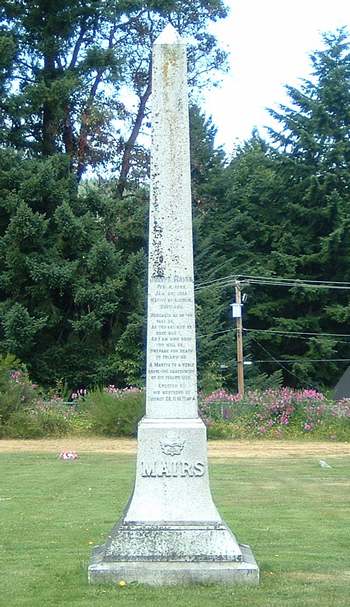 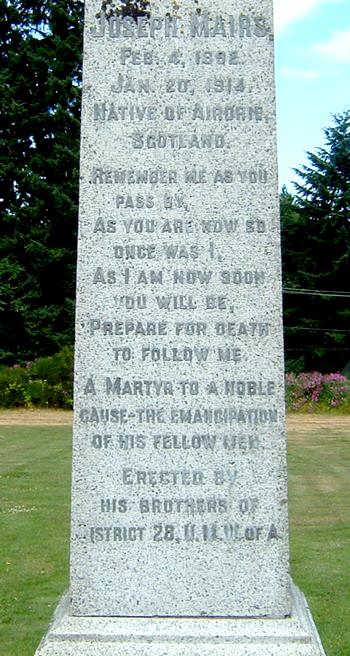 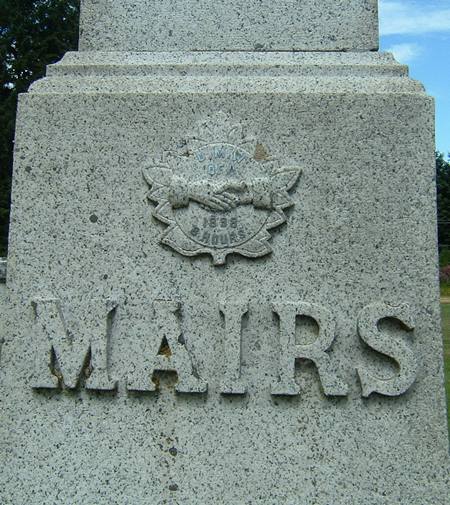
Joseph Mairs was a BC
mineworker born February 4, 1892 in Airdrie, Scotland. Mairs was part
of the pitched battles to organize coal mines on Vancouver Island in
the early 1900s. The website josephmairs.ca writes, "A bitter struggle
started that September in 1912 which lasted until the start of World
War I. The Vancouver and Nanaimo Coal Co settled in 1913 but the other
three owners would not. They brought in strikebreakers and evicted
strikers from company housing. Clashes broke out between strikers and
the police and strikebreakers at all the mines. The AG William Bowser
sent in the militia and they remained until the end of the strike. [...]
"Joseph was arrested on August
15, 1913 after the Militia retook the Town of Ladysmith from striking
miners. Miners had held the town from August 12th to 15th. They stoned
the residences of scabs and drove them out of town. He was sentenced to
one year in jail and a $100 fine. In January, Joseph became ill and
receiving no medical attention died on January 20th, 1914."
Forest Workers Memorial Park in Lake Cowichan
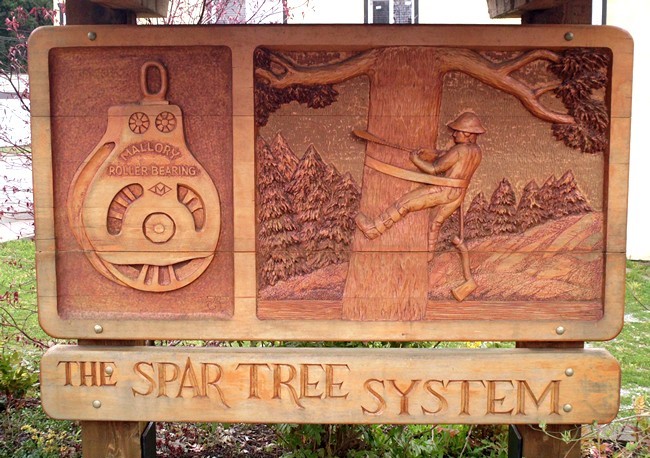 The Forest Workers Memorial
Park was built by the Cowichan Lake Community Forest Cooperative to
honour all forestry workers, including those who worked on the railway,
in the Cowichan Lake area. It was inaugurated in May 2007. The website
tim-ber.blogspot.ca, describes the memorial: "Key features of the park
are a chunk of concrete foundation from the CNR bridge over the
Cowichan River, which symolizes the many logging railways around the
lake; a fountain which recognizes the mountains, lake, and rivers in
the Cowichan Lake area; three interpretive panels richly carved in
yellow cedar and depicting historic scenes from the forest industry;
and the commemorative bricks recognizing workers and companies past and
present. Special brown-coloured bricks with a tree emblem recognize
workers who lost their lives on the job." The Forest Workers Memorial
Park was built by the Cowichan Lake Community Forest Cooperative to
honour all forestry workers, including those who worked on the railway,
in the Cowichan Lake area. It was inaugurated in May 2007. The website
tim-ber.blogspot.ca, describes the memorial: "Key features of the park
are a chunk of concrete foundation from the CNR bridge over the
Cowichan River, which symolizes the many logging railways around the
lake; a fountain which recognizes the mountains, lake, and rivers in
the Cowichan Lake area; three interpretive panels richly carved in
yellow cedar and depicting historic scenes from the forest industry;
and the commemorative bricks recognizing workers and companies past and
present. Special brown-coloured bricks with a tree emblem recognize
workers who lost their lives on the job."

Whose Resources? Our Resources!
NDP Leader Speaks Out Against Kinder Morgan Pipeline
Expansion to Vancouver Harbour
Demonstration in Vancouver, March 26, 2012
against expansion of Kinder Morgan pipeline. (Media Coop)
On Earth Day April 22, BC NDP leader Adrian Dix
stated his Party's opposition to the twinning of the Kinder Morgan oil
pipeline from Alberta
to Vancouver, which would more than double its capacity. Standing with
supporters on the North Thompson River, Dix said, "We do not expect
Vancouver
to become a major oil export port as appears to be suggested in what
Kinder Morgan is proposing. I don't think that the port of Vancouver,
as busy a port
as it is and successful a port as it is, should become a major oil
export port." Dix added he would wait until the proposal is reviewed
before making a final
stand.
The former Trans-Mountain pipeline now owned by the
global monopoly Kinder Morgan was built in the 1950s to provide Alberta
oil feedstock to
refineries that used to operate in Vancouver. Today only one refinery,
Chevron, remains. Kinder Morgan, rather than supplying feedstock for
refining in
Vancouver envisions turning the Chevron facility into primarily an
exporter of raw bitumen to Asia transported in "Suezmax" size tankers
(160,000 tons),
increasing the number of tankers travelling through Vancouver's Burrard
Inlet from five a month to 35.
The NDP's announcement on
the Kinder Morgan pipeline was immediately greeted positively by
several leaders of the environmental movement in BC.
"Residents of Victoria and the Gulf Islands are not willing to accept
the risks of a new Kinder Morgan pipeline and corresponding surge in
oil tanker traffic
off our south coast," said Sarah Cox, BC's Sierra Club spokeswoman in a
statement. "The city of Victoria and Union of BC Municipalities have
passed
resolutions opposing the expansion of oil-tanker traffic on BC's coast.
Victoria city council has expressed 'unequivocal opposition' to the
Kinder Morgan
proposal."
Other environmental activists stated that Dix's stand
against the Kinder Morgan project has led them to decide to support the
NDP against the Liberal
Party, and they declared their intention to campaign for David Eby in
Point
Grey against Liberal Premier Christy Clark.
In other environmental news, Dix announced an NDP
government would liquidate the Pacific Carbon Trust. He proposed to
continue the current policy
to make BC government operations "carbon neutral," which includes a
carbon tax on public institutions. A difference in his policy proposal
would be to stop
handing over carbon tax revenue directly to large private corporate
enterprises.[1]
Instead, Dix said carbon tax
funds would be used for public transit and other "green initiatives."
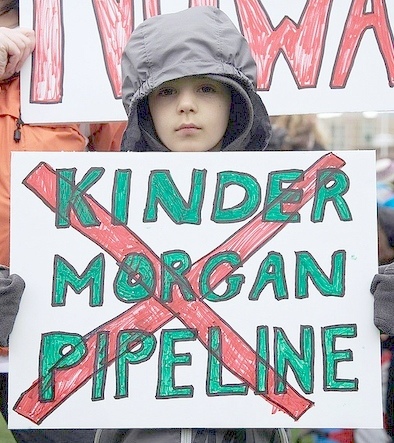 "In our plan we've laid out
over the next three years an
investment of $30 million, $40 million and $50 million that will go
primarily from the carbon
tax ... to support transit around British Columbia and other green
initiatives in communities that don't have a transit system," said Dix. "In our plan we've laid out
over the next three years an
investment of $30 million, $40 million and $50 million that will go
primarily from the carbon
tax ... to support transit around British Columbia and other green
initiatives in communities that don't have a transit system," said Dix.
Dix said schools, hospitals and other public
institutions have paid tens of millions of dollars in carbon offset
emission levies, while private companies
received similar amounts of money for merely listing their inventory of
uncut forests or unused gas projects.
"The [current Liberal] government's view on carbon
neutral government is to take money from cash-starved hospitals and
give it to big polluters," he
said. "We think that money should be kept to support public
institutions."
Under the proposed NDP carbon offset plan, public
institutions will still pay to offset their carbon emissions, but the
money will be used to fund public
green projects as opposed to giving money to private corporations. Dix
said the amount of new money for the environmental proposal would be
$36 million
over this fiscal year, rising to $60 million by 2015-16, pushing the
party's total new spending commitments for this year to $238-million,
and to $739-million
by 2015-16.
Note
1. For further information on
this issue read "Pay-the-Rich
Corruption and
Attacks on Social Programs," TML
Daily, April 16, 2013 - No. 50.

Who Decides? The Need for Public Control
of Natural Resources
The BC Liberals headed by Christy Clark claim
that the province will receive a huge royalty bonanza if LNG plants are
built to ship natural gas
in liquid form to Asia. Royalties are presented as a form of payment
for the resources or economic rent.
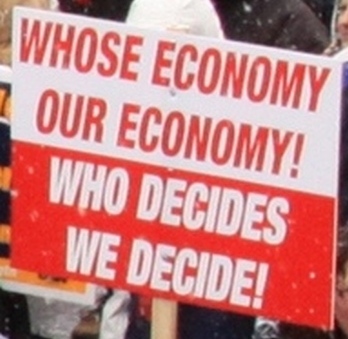 According to the government,
the share of revenue from
the sale of natural gas resources is fair compensation to the people of
BC and the First Nations
for handing over these resources to private interests, mainly foreign
oil and gas cartels. Such claims of fair compensation are intended to
deflect public
opposition away from the sellout of public natural resources and to
cover up a reality of massive public payments to private interests
involved in building
and managing these projects. According to the government,
the share of revenue from
the sale of natural gas resources is fair compensation to the people of
BC and the First Nations
for handing over these resources to private interests, mainly foreign
oil and gas cartels. Such claims of fair compensation are intended to
deflect public
opposition away from the sellout of public natural resources and to
cover up a reality of massive public payments to private interests
involved in building
and managing these projects.
The development of natural resources should be a
decision of the body politic including First Nations, and the wealth
generated should go directly into
the public treasury to benefit all the people including First Nations
and the general interests of society. Natural resources are a public
treasure and should
not fall into the hands or control of private interests under any
circumstances. This principle includes public control of all aspects of
natural resource
extraction, transformation into usable products, determination of
prices of production and their distribution and sale at home and abroad.
BC Natural Gas
Not only are the natural gas resources handed over to
the monopolies with minimal returns, the working class and people of BC
are forced
to pay the mainly foreign energy cartels some of the investment funds
needed for development.
For example, companies fracking in the Montney shale gas
region in Northeastern BC are charged less than half the cost of
production of the electricity
BC Hydro provides them. This subsidy is estimated to be worth $150
million a year to the gas monopolies during peak production. The loss
to BC Hydro
is made up by raising electricity rates for BC households and certain
commercial users, especially small businesses. Another subsidy is
provided with the
upgrading of BC Hydro's transmission line in the region at a cost of
$255 million, a line needed only for the Montney shale gas development.
All this comes with a return to the public treasury on
natural gas in the form of BC royalties for the 2012-2013 year of only
$144 million on natural
gas production of 1.2 billion cubic feet.
Other pay-the-rich schemes include the Infrastructure
Royalty
Credit
Program that provides credits for all-season road
projects and new
pipeline projects. In February 2013, BC Premier Clark announced that up
to $120 million in credits would be provided in the most recent
installment from
this program.
Also, the Oil and Gas Rural Roads Improvement
Program invests in the upgrade of public roads and bridges heavily
used and required by
the oil and gas industry. The Sierra Yoyo Desan (SYD) road project is a
private-public-partnership (P3) to upgrade the SYD Road located near
Fort Nelson,
providing reliable year-round access to the Horn River and Cordova
Basins. All of these developments mainly and sometimes exclusively
benefit the
monopolies drilling in the Montney.
Whose Resources? The People's Resources!
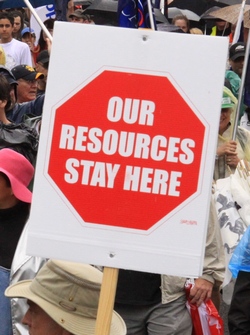 Natural resources belong to
the people. The development
and use of natural resources must be under the control of the people
and serve their
interests and the general interests of society. The people must benefit
in full from natural resource development, transformation and
distribution. Together
with the human factor, natural resources are part of the foundation of
modern life and society. The concept of private interests owning
natural resources and
controlling the land where they are found should be considered as
repugnant as ownership of human beings. Natural resources belong to
the people. The development
and use of natural resources must be under the control of the people
and serve their
interests and the general interests of society. The people must benefit
in full from natural resource development, transformation and
distribution. Together
with the human factor, natural resources are part of the foundation of
modern life and society. The concept of private interests owning
natural resources and
controlling the land where they are found should be considered as
repugnant as ownership of human beings.
Private control over society's land and resources
creates monopolies and a privileged class, which then demand the
monopoly right to prohibit their use
by the vast majority of the people and deprive the people and society
of the benefits from their socially responsible development. This
monopoly control
leads to negative social and environmental consequences. To enforce
monopoly right, the BC Liberal government in concert with the Harper
dictatorship
have politicized the private interests of monopolies and depoliticized
public interest.
A big contradiction in private ownership of natural
resources is that their development requires vast public infrastructure
and other public monies to bring
those resources into development and to organize their distribution.
Without public monies and other state assistance, private owners would
not be capable
of exploiting natural resources yet they insist on exercising control
over development and the benefits that arise.
Also, the natural and social consequences of such
development are also ignored or at least not addressed in a socially
responsible manner, as the aim
is private gain. The Harper dictatorship's attack on environmental and
other regulations and the Clark Liberal regime's irresponsible pushing
of mining and
fracking on behalf of the monopolies contradict the need for social
responsibility surrounding any natural resource project. Social
responsibility includes the
necessity to investigate, predict and solve any negative social and
natural consequences before they occur.
The people demand a new pro-social direction for the
economy, which includes public control over natural resource
development. A step in this new
direction towards humanizing the natural and social environment is to
say No! to the sellout and pay-the-rich schemes of the BC
anti-social Clark
Liberals in the May 14 election.

May Day 2013
All Out for International Day of
Working Class Unity and Struggle
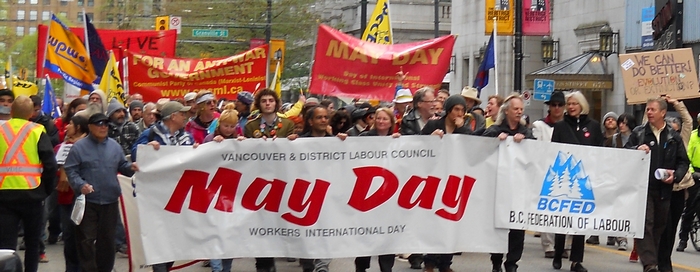
Vancouver
March and Rally
Wednesday,
May
1
--
5:00
pm
Gather at Commercial Dr & 14th (Clark Park Entrance) march
to
Grandview Park (Commercial Dr & Charles St)
For
information: www.vdlc.ca
Anti-Capitalist
March
Wednesday,
May
1
--
6:30
pm
Victory Square (Hastings and Cambie)
For
information: vancouvermayday2013.wordpress.com
Prince
George
Wednesday, May 3:30 -- 5:30 pm
Fort George Park
For
information: tinacousinsPGDTA@gmail.com or (250) 562-7214

PREVIOUS
ISSUES | HOME
Read BC Worker
Website: www.cpcml.ca
Email: office@cpcml.ca
|




 In an example of
pay-the-rich neo-liberal politics, an
exaggerated
demand for private power was imposed on BC Hydro by executive dictate
from the
Premier's Office. Neo-liberal "smaller government" does not mean an
elimination of executive rule, which politicizes privileged private
interests; it means
depoliticizing the public interest through elimination of social
programs, public services and enterprises required by the people and
society. It means a refusal
to meet government's social responsibilities.
In an example of
pay-the-rich neo-liberal politics, an
exaggerated
demand for private power was imposed on BC Hydro by executive dictate
from the
Premier's Office. Neo-liberal "smaller government" does not mean an
elimination of executive rule, which politicizes privileged private
interests; it means
depoliticizing the public interest through elimination of social
programs, public services and enterprises required by the people and
society. It means a refusal
to meet government's social responsibilities.



 Bob Jackson, BC Regional
Executive Vice-President of the Public
Service Alliance of Canada, spoke about a meat inspector in
Saskatchewan
who died of cancer from working in asbestos insulated buildings. He
also talked about the bitter fight to keep open the Kitsilano Coast
Guard Station in
Vancouver which was closed by the Harper government in the name of
austerity. Jackson said too many lives have been lost on the BC coast
from inadequate
Canadian coast guard services.
Bob Jackson, BC Regional
Executive Vice-President of the Public
Service Alliance of Canada, spoke about a meat inspector in
Saskatchewan
who died of cancer from working in asbestos insulated buildings. He
also talked about the bitter fight to keep open the Kitsilano Coast
Guard Station in
Vancouver which was closed by the Harper government in the name of
austerity. Jackson said too many lives have been lost on the BC coast
from inadequate
Canadian coast guard services.


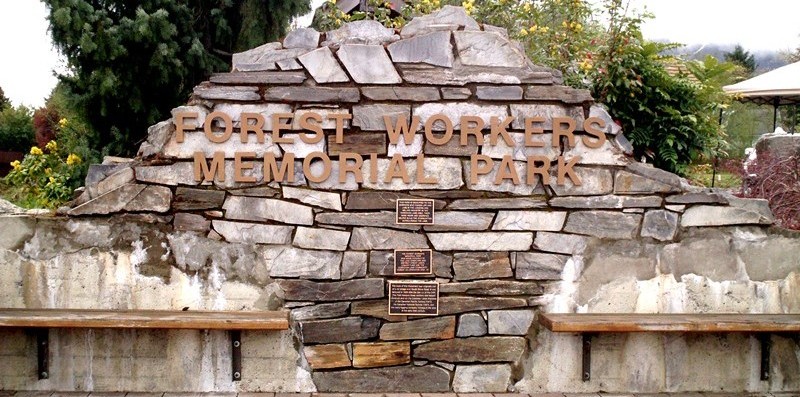
 The Forest Workers Memorial
Park was built by the Cowichan Lake Community Forest Cooperative to
honour all forestry workers, including those who worked on the railway,
in the Cowichan Lake area. It was inaugurated in May 2007. The website
tim-ber.blogspot.ca, describes the memorial: "Key features of the park
are a chunk of concrete foundation from the CNR bridge over the
Cowichan River, which symolizes the many logging railways around the
lake; a fountain which recognizes the mountains, lake, and rivers in
the Cowichan Lake area; three interpretive panels richly carved in
yellow cedar and depicting historic scenes from the forest industry;
and the commemorative bricks recognizing workers and companies past and
present. Special brown-coloured bricks with a tree emblem recognize
workers who lost their lives on the job."
The Forest Workers Memorial
Park was built by the Cowichan Lake Community Forest Cooperative to
honour all forestry workers, including those who worked on the railway,
in the Cowichan Lake area. It was inaugurated in May 2007. The website
tim-ber.blogspot.ca, describes the memorial: "Key features of the park
are a chunk of concrete foundation from the CNR bridge over the
Cowichan River, which symolizes the many logging railways around the
lake; a fountain which recognizes the mountains, lake, and rivers in
the Cowichan Lake area; three interpretive panels richly carved in
yellow cedar and depicting historic scenes from the forest industry;
and the commemorative bricks recognizing workers and companies past and
present. Special brown-coloured bricks with a tree emblem recognize
workers who lost their lives on the job."

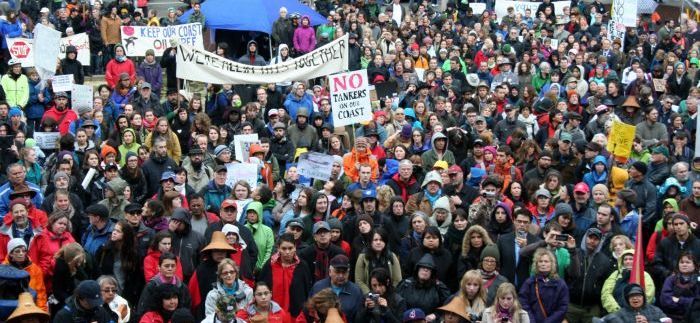
 "In our plan we've laid out
over the next three years an
investment of $30 million, $40 million and $50 million that will go
primarily from the carbon
tax ... to support transit around British Columbia and other green
initiatives in communities that don't have a transit system," said Dix.
"In our plan we've laid out
over the next three years an
investment of $30 million, $40 million and $50 million that will go
primarily from the carbon
tax ... to support transit around British Columbia and other green
initiatives in communities that don't have a transit system," said Dix. According to the government,
the share of revenue from
the sale of natural gas resources is fair compensation to the people of
BC and the First Nations
for handing over these resources to private interests, mainly foreign
oil and gas cartels. Such claims of fair compensation are intended to
deflect public
opposition away from the sellout of public natural resources and to
cover up a reality of massive public payments to private interests
involved in building
and managing these projects.
According to the government,
the share of revenue from
the sale of natural gas resources is fair compensation to the people of
BC and the First Nations
for handing over these resources to private interests, mainly foreign
oil and gas cartels. Such claims of fair compensation are intended to
deflect public
opposition away from the sellout of public natural resources and to
cover up a reality of massive public payments to private interests
involved in building
and managing these projects. Natural resources belong to
the people. The development
and use of natural resources must be under the control of the people
and serve their
interests and the general interests of society. The people must benefit
in full from natural resource development, transformation and
distribution. Together
with the human factor, natural resources are part of the foundation of
modern life and society. The concept of private interests owning
natural resources and
controlling the land where they are found should be considered as
repugnant as ownership of human beings.
Natural resources belong to
the people. The development
and use of natural resources must be under the control of the people
and serve their
interests and the general interests of society. The people must benefit
in full from natural resource development, transformation and
distribution. Together
with the human factor, natural resources are part of the foundation of
modern life and society. The concept of private interests owning
natural resources and
controlling the land where they are found should be considered as
repugnant as ownership of human beings.